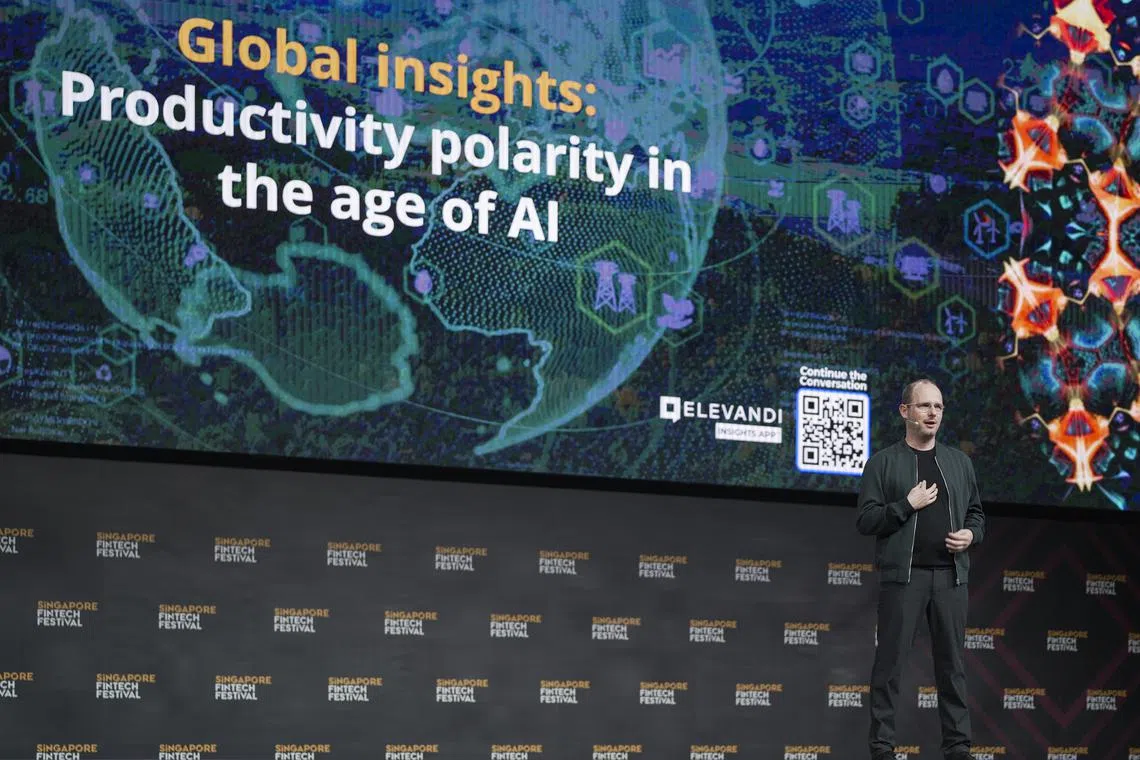AI can boost productivity, but regulation is key: Experts
Sign up now: Get ST's newsletters delivered to your inbox

More regulation is needed to curb the irresponsible use of artificial intelligence, experts warned.
SINGAPORE – Artificial intelligence (AI) technology can boost productivity and enhance efficiency in areas such as fintech and healthcare, but industry experts warn that more regulation is needed.
Their concerns centre on its unpredictability and potential bias, sparking the need for more rules to curb irresponsible use.
In his address at the Singapore Fintech Festival (SFF) on Nov 16, Mr Thomas Dohmke, chief executive of software development company GitHub, said that Harvard University research found that workers using generative AI tool ChatGPT are 40 per cent more productive than those who do not.
He said AI tools are expected to boost the global economy by US$9.5 trillion (S$12.8 trillion) by 2030, noting: “Countries and organisations that figure out how to use AI with reduced risk will exist in a different spectrum of activity, and those who don’t will fall behind.”
Mr Aman Thind, executive vice-president and global chief architect of asset servicing firm State Street, told The Straits Times on the sidelines of the festival at Singapore Expo that AI can help process large amounts of data in fintech applications. It can, for example, be trained to detect fraud in cross-border payments by analysing specific patterns and behaviours over time.
Generative AI, a subset of AI that focuses on content creation, can also access the latest market data and shape investment decisions, Mr Thind said. He cited how the first iteration of ChatGPT exhibited biases around religion and politics, noting that there can be an element of unpredictability in AI resulting from human bias.
Mr Irfan Ahmad, State Street’s head of digital commercialisation for Asia-Pacific, the Middle East and North Africa, added: “A machine (like AI) needs input and a programmer, who is human. Humans are innately fallible – the fallibility goes into the AI’s code and then the bias gets reaffirmed.
“As an industry, we need to make sure that we try and put guardrails in place to ensure that when we do create these models, they take into consideration the biases and remove them systematically ahead of providing the insights for users.”
The Monetary Authority of Singapore (MAS) announced a risk framework for the responsible use of generative AI on Nov 15.
The framework is part of the first phase of Project MindForge, which aims to enable financial institutions here to explore the risks and opportunities in generative AI.
It was developed by the MAS in collaboration with a consortium of banks and private tech companies such as DBS and Microsoft, and identified seven risk areas such as accountability and governance, monitoring and stability, as well as legal and regulatory.
The consortium will also look at the use of generative AI in areas such as compliance management and identifying financial risks. It will then conduct experiments to explore its use in areas such as anti-money laundering, sustainability and cyber security.

Mr Thomas Dohmke, chief executive of software development company GitHub, said it is crucial to have a globally aligned regulatory framework to ensure equal access to the technology’s benefits.
PHOTO: SINGAPORE FINTECH FESTIVAL
MAS chief fintech officer Sopnendu Mohanty said on Nov 15: “As the financial industry continues to explore the potential of generative AI technology, it is crucial that we develop a clear and concise framework for its responsible application.”
Apart from financial use cases, experts said AI can improve accessibility to healthcare. Microsoft executive vice-president of business development Christopher Young said he has encountered start-ups using generative AI to help healthcare professionals diagnose cancer more efficiently.
He told an SFF panel discussion on Nov 16: “One of the opportunities we have in AI is to improve accessibility for some people that may be left behind… For example, helping someone who has impaired vision by asking AI to explain to them what a camera sees.”
Mr Young also noted that Microsoft is looking at ways to embed mental health services within Copilot, an AI assistant introduced earlier in 2023 that can be used within Microsoft’s applications such as PowerPoint and Word.
Mr Manu Chopra, CEO of Microsoft-backed AI start-up Karya, said on the same panel that AI is the best tool to access information: “If I’m a tuberculosis patient, I can just ask AI if I will get better, and I can get a response in my language which will tell me what I need to do.
“The technology can be really transformative.”
Pitchbook data notes that venture capitalist funding for the AI and machine-learning sector in 2022 stood at US$78 billion, a decline of nearly 35 per cent from its all-time high of US$119.9 billion in 2021.
But generative AI is gaining traction among investors, with US$6.1 billion raised in the second quarter of 2023, up from US$4.36 billion in the previous three months – thanks to the blockbuster US$4 billion deal Amazon inked with US-headquartered AI start-up Anthropic.
GitHub’s Mr Dohmke noted that most of the innovation happening around AI is concentrated in Silicon Valley, since many AI start-ups are based in the US. More investments into AI start-ups around the world, including those from Singapore, are needed, he said, adding that it is crucial to have a globally aligned regulatory framework to ensure equal access to the technology’s benefits.
“Imagine your AI software developers in the United States being 55 per cent faster than those in Singapore due to different regulatory environments… That would be terrible. We must activate public and private partnerships, and at the same time foster innovations by individuals so that more new start-ups can become the GDP-driving tech giants of tomorrow.”



